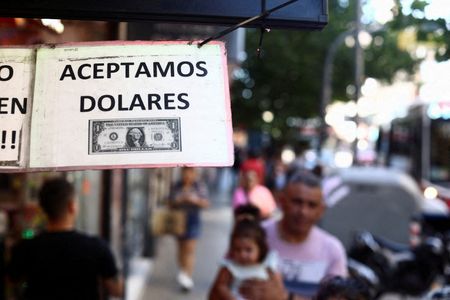BUENOS AIRES (Reuters) – Poverty levels in Argentina hit 57.4% in January, the highest in at least 20 years, according to a report by the Catholic University of Argentina (UCA) cited by local media on Sunday.
According to the report, the devaluation of the peso currency carried out by President Javier Milei shortly after his inauguration in early December – and the price hikes caused by it – exacerbated poverty levels, which closed the year at 49.5%.
“The true inheritance of the caste model: Six out of every 10 Argentines are poor,” Milei, a libertarian, said in a social media post late on Saturday.
Milei took office promising to “dollarize” the economy, tame an annual inflation rate of more than 200%, eliminate the fiscal deficit and end benefits for Argentina’s political dynasties, which Milei calls “the caste.”
In December, his government rolled out sweeping economic reforms, primarily a 54% peso devaluation against the U.S. dollar, causing Argentines’ incomes to collapse as prices shot up.
Other measures included slashing energy and transportation subsidies and rolling out tax hikes aimed at reaching fiscal balance.
On Friday, Argentina’s economy ministry reported a January budget surplus of 518.41 billion pesos ($620.85 million), the first time the number has been in the green since August 2012.
Reuters was not immediately able to see a copy of the report. UCA did not respond to a request for comment.
($1 = 835.00 Argentine pesos)
(Reporting by Eliana Raszewski in Buenos Aires; Writing by Kylie Madry; Editing by Matthew Lewis)
